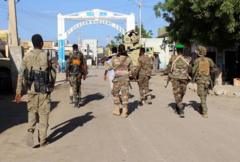Somaliland, a self-declared independent region from Somalia, is leveraging its strategic ports to gain U.S. recognition and strengthen its political standing, challenging China's influence in Africa.
Somaliland's Bid for Recognition: A New Strategy in Global Politics

Somaliland's Bid for Recognition: A New Strategy in Global Politics
Somaliland seeks U.S. recognition and statehood amid geopolitical tensions and strategic aspirations.
In a bid for diplomatic recognition, Somaliland, an autonomous region of around five million residents that has operated independently of Somalia since 1991, is hoping to seal a deal with the United States. The region, which already has its own currency and passport, aims to coexist as a state through its offer to lease key infrastructure to the U.S. government in exchange for official backing and statehood status.
At the center of this strategy are the port facilities and a Cold War-era airstrip located in Berbera, a city that serves as a critical point along the Gulf of Aden, a major artery for global shipping. Somaliland’s officials believe that if President Trump grants them recognition, it can dramatically alter their international standing, attracting investment and reinforcing diplomatic ties that could enhance security across the region.
Despite a successful track record of holding independent elections viewed favorably by international monitors, experts caution against this move. There are fears that recognizing Somaliland could provoke instability, embolden militancy from groups like Al Shabab, and set off a ripple effect of secessionist movements throughout Africa, upsetting regional allies such as Egypt and Turkey.
The political landscape may be ripe for Somaliland's aspirations, with the United States reassessing its strategic interests in Somalia amid ongoing security threats posed by Houthi rebels and other extremist factions. Should the U.S. withdraw from Mogadishu, the administration might see an opportunity to assert its presence in the Horn of Africa by strengthening ties with Somaliland, thus countering China’s expanding influence across the continent.
The port and airstrip aren’t just assets for Somaliland; they represent a potential geopolitical foothold that could redefine the balance of power in East Africa. As the region grapples with its complex security dynamics, the international community watches closely to see how Somaliland’s quest for recognition unfolds amid the backdrop of U.S.-China tensions.






















